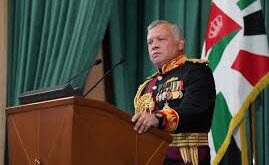Year 2015 has been a turning point in the Middle East and North Africa (MENA) region due to the rise of extremism and the counter-extremism strategy, led by the Russians to transform the extremist pathology from a hero to zero. Simply Russians are changing the “seating status” by turning the old order on its head, where foes become allies, using enemies to fight each other.
The unprecedented upheaval of Daesh flamboyantly revealed threat it is no longer simply a regional threat. And the empowerment to Jordan to issue a list of terrorist groups as well as the recent UNSC meeting and adoption of a resolution to “take more assertive steps to cut off the funding” of these extremist groups. This was a main victory for Russian strategies against extremism and radicalism.
The first three quarters of 2015 was full of chaos due to the “foggy smoggy” reactions towards extremism. The fourth quarter was when the Russian took the lead and had initiated their campaign against extremism militarily.
Extremism is at one time a constant and evolving. This scourge is infecting the bodies of souls of men and women, young and old, throughout the MENA region and beyond. This extremism, of hate, of anti-social and counter-civilization, is spreading. Tolerance appears to be fading between communities based on geography, tribes, sectarianism, and the corruption between what is right and what is wrong. Executions, bombing, shootings, and black market crime are now the new norm.
The evolution of extremism can be seen in the ideological trappings of Islamic State and their vilayets and appendages that reach from West Africa to Southeast Asia. The cult-like reach of Daesh is, instead of residing with kinetic action, is growing in popularity. Islamic State’s program is clear and Daesh’s ability to gain new believers and supporters is reaching epidemic proportions.
Al-Qaeda affiliates are also evolving into swift action brigades and cells who are locked in an ideological and hearts and minds campaign for local domination in key tactical regions from an extremist point of view against Daesh. While Islamic State seems to have an upper hand given its robust media capability and networking system, al-Q affiliates are able to garner members at the local level based on tribal attributes and local grievances.
Extremism is not limited to the above groups. Extremism exists not only by ethnicity such as Ukraine or the Far Right in Europe and the Americas but also in other religions that seek to dominate state policy through violence. These groups abhor peaceful and diplomatic discussions with their opponents.
This year has been a victory for the Russians with the adoption of western governments of the Syrian President Bashar Al Assad as a solution of the current Syrian issue. The unwilling consensus seems to be that the Syrian regime and its army will prone to be part of the solution.
2015 began and ended with bloodbath in Paris; individuals affiliated with Daesh have also claimed the mass murder of tourists in Soussa, Tunisia, Afghanistan, Lebanon, Syria, Egypt, Iraq and the bombing of a Russian jet over Sinai, and the recent shootings in Bernardino, California, US.
The Russian President Vladimir Putin had grabbed tight the diplomatic and military initiatives since he managed to form a joint, international reaction against extremism. President Putin’s plan had been the master key to Vienna Conference , which began in October.
Extremism can be seen in the behaviour of foreign nationals who act out their politics and grievances within the country. Fires that ravage warehouses and other facilities are only going to grow if eyes are not watching carefully. Economic damage is a primary motivator of discontent. This fact is extremist in itself.
What is occurring now is that extremist groups such as Islamic State and Al-Qaeda affiliates are developing a model of chaos that is easily picked up by “wanna-be” extremists. That threat, mixed with blatant attempts by these groups to not only recruit and develop cells in the the MENA but also smuggle weapons and explosives in to the country means that it is only a matter of time before a catastrophe occurs. But given the trajectory of extremism, more threats will emerge from various corners of the region.
Shehab Al Makahleh
 Geostrategic Media Political Commentary, Analysis, Security, Defense
Geostrategic Media Political Commentary, Analysis, Security, Defense





